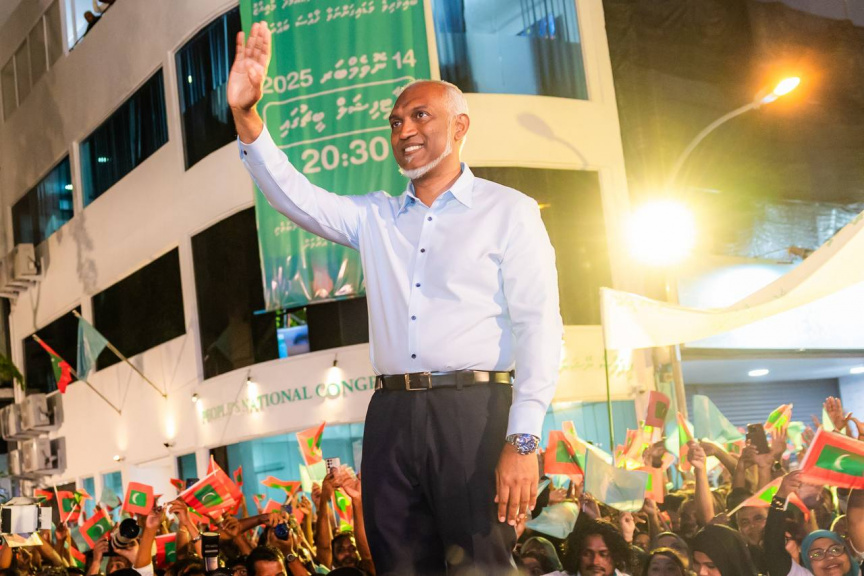
President Dr. Mohamed Muizzu speaks at PNC's mass rally on November 14, 2025. (Sun Photo/Moosa Nadheem)
Let’s rewind to two years and one month ago. To a public disillusioned by unmet promises, then-opposition candidate Dr. Mohamed Muizzu offered a vision of hope.
He pledged to solve the Maldives’ most pressing social issue, housing. He acknowledged the country’s crushing debt, but assured that financing had already been secured through allies. He vowed not to interfere with the judiciary, to uphold media freedom, and to appoint capable individuals without bloating political ranks.

The scale of that hope was evident in the election results. A significant portion of the electorate rejected the incumbent, President Ibrahim Mohamed Solih, despite his administration’s last-ditch efforts to secure a second term. Instead, they placed their trust in Muizzu.
There was another reason for this optimism. Unlike many before him, Muizzu had climbed the ranks. In countries like China and Singapore, often cited as models of meritocracy, leaders rise through experience. Muizzu’s trajectory mirrored that path. He served as Housing Minister for seven years and worked under former President Abdulla Yameen Abdul Qayoom, a leader some liken to the late Ibrahim Nasir. The transformative infrastructure projects of that era were largely executed under Muizzu’s ministry. He also broke MDP’s long grip on Malé City by winning the mayoral seat, and secured the PNC’s presidential ticket despite internal resistance.

The voyage toward Muizzu’s promised Dhiveheenge Raajje turns two today. It has not been smooth sailing. The national vessel has weathered storms, skirted reefs, and at times seemed on the verge of capsizing.
Muizzu has remained visibly active, just as he was as a minister. He’s taken bold stances on tobacco and narcotics. But when he assumed office, the country was already burdened by debt and economic fatigue. Reform was essential.
Yet, over the past 730 days, the government appears to have prioritized spending over reform. Political appointments, once promised to be capped at 700, have ballooned past a thousand. Transparency was lacking; journalists’ requests for figures were initially stonewalled. Loyalty often trumped merit in appointments, from ministers to SOE executives. Many now wear suits that don’t quite fit the roles they hold.

Opening ATMs or tweaking card limits are not presidential milestones in 2025. Government companies, instead of focusing on productivity, have been used for political optics. MACL, once a respected institution, has seen a surge in idle high-salaried hires and is now building gyms instead of airports. RDC is building hospitals. FDC is building schools.
Then there’s the economic front. Grand announcements, from bunkering services to a Saudi prince’s investment, have yielded little. The dollar rate, once promised to remain stable, has hit historic highs. The Year of Housing is nearly over, yet major projects like the Rasmalé tunnel remain stalled. Budgets are drying up while groundwork lags behind.
Muizzu pledged to end judicial interference. Yet, the constitutional amendment enabling parties to strip MPs of their seats led to a Supreme Court showdown. The treatment of Justices Husnu Al Suood, Mahaz Ali Zahir, and Dr. Azmiralda Zahir raised serious concerns about judicial independence.
The media has not been spared. A bill introduced by Thulhaadhoo MP Abdul Hannan, closely aligned with the government, was passed by the PNC-majority parliament and ratified by the President, despite widespread criticism. It now stands as a law that curtails press freedom.

Parliament, meanwhile, has become a rubber stamp. With the largest majority in Maldivian history, the government faces little resistance. Debate is rare. Oversight is weaker than ever.
While the President blamed lower and mid-level workers for corruption in his Republic Day address, many found this claim implausible. The public perception remains: it is those at the top who benefit most from state resources.
Despite promises to cut double pensions, reform Aasandha, and target subsidies, little has materialized. Instead, the government continues to announce new spending, on canned tuna giveaways, electricity subsidies, and more, despite the dire fiscal outlook.

The people gave Muizzu a strong mandate to reform. With sincerity and resolve, he could still deliver. But two years in, the administration appears unsettled, more focused on headlines than on legacy.
Ultimately, it is the people who must decide:
Are we on course toward the promised Dhiveheenge Raajje?
How will they grade this government at the two-year mark?